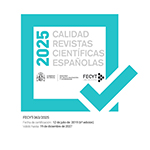The Male influence on the formation of women's identity through sports videogames. A stereotyped, objectified and romanticized representation
Abstract
Introduction: This paper explores the relationship between the videogame industry and sports, two disciplines that traditionally contribute to fixing stereotypes that infuse a reality around women based on inadequate assumptions and generally interpreted from a masculinized perspective. Objectives: Taking surfing as an example, a sport linked to a markedly masculine environment, this work seeks to learn how the female surfer is represented in the videogame to verify if, as happens in the real world, the woman is deprived of any identity or own style. Specifically, the aim is to study how the female surfer is represented in the videogame in order to understand how these virtual representations affect the identity of women as athletes. Methodology: A mixed method is proposed whose approach aims to recover information from two perspectives: the participant and the communicative. The participant perspective consists of a first phase that is carried out through an immersive experience that includes practice and exposure to the videogame, and a second phase in which a focus group is held with the participants to evaluate their exposure to it. The communicative perspective consists of the analysis of the content of the Instagram account of the videogame. Results and Conclusions: The analyzed videogame highlights a masculinized, sexualized and romanticized female stereotype. It is specified that there is a specific style of the female surfer characterized by an objectified character and stripped of any possible sports component, establishing a cause-effect relationship between the representation of women in the videogame and its influence on the identity of women as sports subjects. It is evident a gender gap between men and women that affects a field that goes beyond sports, causing a strong impact on the identity of women.
Downloads
Article download
License
In order to support the global exchange of knowledge, the journal Investigaciones Feministas is allowing unrestricted access to its content as from its publication in this electronic edition, and as such it is an open-access journal. The originals published in this journal are the property of the Complutense University of Madrid and any reproduction thereof in full or in part must cite the source. All content is distributed under a Creative Commons Attribution 4.0 use and distribution licence (CC BY 4.0). This circumstance must be expressly stated in these terms where necessary. You can view the summary and the complete legal text of the licence.











